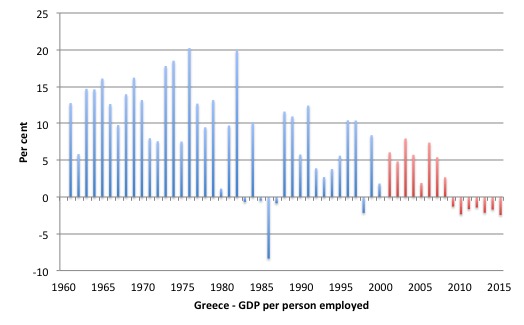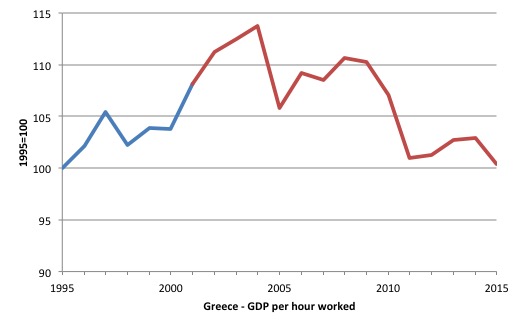Fiscal policy is a potent instrument for productivity growth
Bill Mitchell - billy blog » Eurozone 2016-04-04
Sometimes we have to take a longer look at things to see the present in perspective. Greece has been a living experiment for the neo-liberal Groupthink machine that is the Troika. We rarely experiment on humans on any sort of large-scale if there is the likelihood of adverse result. That would breach any notion of human ethics. It is a pity that we relax those standards when dealing with other animals, but that is another story again, which I will leave silent here. The Nazis certainly conducted large-scale experiments on humans and we vilified them for it. The Troika is conducting different types of experiments on the citizens of Greece, which defy reason, and which also have had devastating effects. But still the mantra continues from the babbling mouths of the political leadership in Europe and its technocratic squawk squad (SS) embedded in the European Commission bureaucracy, the ECB, the IMF and various so-called ‘think tanks’ that continually pump out pro-Euro propaganda disguised as research – more structural reform, more fiscal austerity. Apparently, this scorched earth approach is the only alternative and will deliver higher productivity, increased international competitiveness and underpin a return to prosperity. Greece is on the front line of this approach. I never believed it would work because it defies economic reason. Economic reason that is not blighted by the neo-liberal Groupthink. It hasn’t worked. And now, the IMF, or at least segments within the IMF, are admitting that and producing research that supports the opposite case – the Modern Monetary Theory (MMT) case – that expansive “fiscal policy is a potent instrument for productivity growth through innovation”. Correct!
Here is a graph produced using data from the European Commission’s – AMECO Database – which shows the growth in Gross Domestic Product per person employed for Greece from 1960 to 2015. The red bars denote the period since the nation joined the Eurozone.
It is incontrovertible that labour productivity has fallen dramatically since Greece joined the Eurozone and has been negative since 2009 when the austerity and the so-called ‘structural reforms’ began in earnest.
The next graph shows GDP per hour worked for Greece from 1995 (when the first convergence processes were put in place) to 2015. The index is set to 100 at 1995. The facts speak for themselves. There has not been a productivity boom following the introduction of the so-called ‘structural reforms’ and fiscal austerity. Quite the opposite. Productivity per hour worked is now back to the level it was in 1995.
Last week (March 31, 2016), the IMF published a pre-release of their next – Fiscal Monitor April 2016 – which comprised the complete – Chapter 2: Fiscal Policies for Innovation and Growth.
After years of inflicting massive hardship on Greece in the form of harsh fiscal cutbacks and huge attacks on the working pay and conditions, income support and pensions and other aspects of Greek society that help to make it inclusive and supportive of the disadvantaged, the IMF now has the temerity to write:
Against a backdrop of mediocre medium-term growth prospects, identifying policies that could lift productivity growth by promoting innovation is critical. Fiscal policy can play an important role in stimulating innovation through its effects on research and development (R&D), entrepreneurship, and technology transfer.
It makes one think that this institution is living in a parallel universe.
They now claim that “New analysis … identifies areas in which fiscal policy should do more”. It is a pity they didn’t understand this a decade or so ago.
But even more so, it is a pity they didn’t understand this 40 years ago as they embarked on their so-called ‘structural adjustment programs’ (SAPs), which they inflicted at great cost on the poorest nations in this world.
The IMF now claims that:
1. Advanced economies can boost their long-term GDP by 5 per cent and “can achieve this dividend through well-designed policies that include fiscal R&D incentives and complimentary public investments in basic research.”
2. “fiscal R&D incentives … particularly during recessions … play an important role in supporting R&D investment”.
3. “In emerging market and developing economies, investment in education and infrastructure strengthens their capacity to absorb technologies from abroad.”
All of these claims would represent the antithesis of fiscal austerity and the harsh SAPs that the IMF has pushed for years.
The IMF states the obvious that:
R&D expenditures are widely seen as a key driver of TFP growth. To promote these expenditures, governments can either invest directly in R&D (through public universities, government research institutes, and defense-related research) or design policies that encourage firms to undertake more private R&D.
I guess a whole host of mainstream economists will say yes we have known that all along. This cohort apparently knows everything except they really state anything that is factual.
They advocate fiscal contraction that concentrate the cuts, in part, on tertiary education and public research expenditure. They claim the market will fund R&D much better than public institutions.
But now the IMF is stating the importance of government expenditure in this area, these mainstream economists will forget their previous exhortations for government to cut public expenditure.
The IMF quotes data that shows that US firms “shifted away from doing basic scientific research” between 1980 and 2007.
This is the type of research that we do in universities that advance basic knowledge and which has been under constant attack from the funding bodies in this neoliberal era, even though the IMF report that “Public R&D programs often yield positive and sometimes high rates of return, averaging about 20 percent”.
The IMF also notes that:
Private R&D investments chosen by individual firms might be lower than the socially efficient level because of two important market failures: credit constraints and externalities.
Heterodox economists have long understood the importance of public support from research and authors such as Mariana Mazzucato have recently brought into relief the facts that the major innovations and advances in our time are spawned by strong state involvement – both direct and in terms of funding.
The private ‘market’ does a bad job in this area without strong fiscal support.
So why would we allow governments to cut spending in these areas, especially in times of recession, where growth is needed?
Fiscal countercyclicality is good for R&D
The IMF has been one of the champions of so-called ‘fiscal consolidation’ – which really means cutting net public spending against the cycle – when private spending is also contracting or weak.
As we know, when private spending is contracting or weak, the fiscal position will move further into deficit (typically) as a result of the automatic stabilisers (falling tax revenue and rising welfare spending) without any discretionary change in government fiscal policy parameters.
The rising fiscal deficit has been held out by the likes of the IMF as a precursor to government insolvency, which has to be avoided by so-called ‘fiscal consolidation’. The IMF has led the way in what we call pro cyclical fiscal adjustment.
Please read my blogs – IMF agreements pro-cyclical in low income countries and Exploring pro-cyclical budget positions – for more discussion on this point.
In the April 2016 Fiscal Monitor, they write instead that:
Fiscal stabilization policies can promote R&D investments by helping dampen recessions. Firms may encounter difficulties in obtaining funding for R&D investments because R&D often involves a high level of risk, significant fixed costs, and returns that materialize only in the medium to long term. Firms’ ability to borrow can be especially impaired during recessions, when liquidity risks are more prevalent. By reducing business cycle volatility, a more countercyclical scal policy can pave the way for greater private R&D
But then we knew all this all along, which is one of the advantages of discretionary increases in the fiscal deficit when times are tough to provide sufficient spending to improve confidence and, more specifically, promote R&D.
The IMF produce “new analysis” which shows that “that higher fiscal countercyclicality increases R&D expenditure significantly more in industries that are highly dependent on external finance.”
Let us be clear:
1. Fiscal austerity equals fiscal procyclicality.
2. Fiscal countercyclicality means discretionary increases in government net spending in times of lower activity – that is, higher fiscal deficits. The anathema of what the IMF has been pushing on beleagured nations.
Fiscal policy is essential to correct market failure
The IMF also argue (NOW!) that “domestic social rates of return to private R&D are generally estimated to be two to three times the private return” and “that market forces will lead to an underinvestment in R&D compared with the level that is socially efficient”.
Who would have ever though!
So the market is incapable of delivering sufficient R&D. Solution?
We knew all along …
The IMF say:
This underinvestment can be addressed by corrective fiscal instruments that provide incentives for private R&D. Fiscal incentives such as tax credits and direct subsidies can lower the private cost of R&D so that firms are inclined to invest more, which is socially desirable because other firms will benefit, too.
The upshot is that the IMF conclude:
1. “Good fiscal stabilization policies promote R&D” – so why would we continue to support pro-cyclical fiscal cuts?
2. “Governments should do more to boost R&D” – by increasing deficits!.
3. “Governments can invest more in public R&D, such as basic scientific research, which will advance firms’ own research activities”.
4. “Technology transfer in emerging market and developing economies requires better institutions, education, and infrastructure.” So why would we support policies (advocated in the past by the IMF) that attack basic education, training and health infrastructure in poorer economies?
Conclusion
Have another look at the graphs at the start of this blog and think about the sort of policies that the Troika have inflicted on Greece in the name of increased productivity. Then try to square that with their latest missives on the topic of fiscal policy.
The IMF is an organisation is in chaos – locked into a dangerous Groupthink but staring at the facts each day which should lead them free from that sort of patterned behaviour.
The IMF also think they are comedians.
In their blog on the subject – Imagine What Fiscal Policy Could Do For Innovation – they conclude:
Can you imagine Keynes and Schumpeter smiling together?
This is an organisation that should be disbanded.
Upcoming Spanish Speaking Tour and Book Presentations – May 5-13, 2016
Here are the details of my upcoming Spanish speaking tour which will coincide with the release of the Spanish translation of my my current book – Eurozone Dystopia: Groupthink and Denial on a Grand Scale (published in English May 2015).
You can save the flyer below to keep the details handy if you are interested. All events are open to the public who are encouraged to attend.
1. Madrid, May 5, 2016 – 19:00 at the Club de Amigos de la Unesco, Calle Atocha 20, 28012.
Speakers:
- William Mitchell, author
- Alberto Garzón, Diputado de IU
- Eduardo Garzón, economist
- Stuart Medina, economist and member of Asociación por el Pleno Empleo y la Estabilidad de Precios
2. Badajoz, May 6, 2016 at 12:00 at the Aula Magna de la Facultad de Economía.
Speakers:
- William Mitchell, author
- Francisco Manuel Parejo Moruno, Profesor de Historia de Pensamiento Económico
- Esteban Cruz Hidalgo, economist and member of APEEP
3. Barcelona, May 9, 2016 at 12:00 at Sala de Graus de la Facultat d ́Economia i Empresa de la Universitat de Barcelona, Av. Diagonal 690, 08034 Barcelona.
Speakers:
- William Mitchell, author
- Antoni Soy, profesor de economía aplicada de la Universidad de Barcelona
4. Barcelona, May 9, 2016 at 19:00 at Auditori del Collegi d ́Economistes de Catalunya, Pl. Gal·la Placídia 32, 08006 Barcelona
Speakers:
- William Mitchell, author
- Antoni Soy, profesor de economía aplicada de la Universidad de Barcelona
5. Valencia, May 11, 2016 at 19:00 at La Nau de Valencia.
Speakers:
- William Mitchell, author
- Jorge Amar, economist, President of APEEP
- Raúl de Arriba, Profesor en la Facultad de Economía de Valencia
FINALLY – Introductory Modern Monetary Theory (MMT) Textbook
We have now published the first version of our MMT textbook – Modern Monetary Theory and Practice: an Introductory Text (March 10, 2016).
The long-awaited book is authored by myself, Randy Wray and Martin Watts.
It is available for purchase at:
1. Amazon.com (60 US dollars)
2. Amazon.co.uk (£42.00)
3. Amazon Europe Portal (€58.85)
4. Create Space Portal (60 US dollars)
By way of explanation, this edition contains 15 Chapters and is designed as an introductory textbook for university-level macroeconomics students.
It is based on the principles of Modern Monetary Theory (MMT) and includes the following detailed chapters:
Chapter 1: Introduction Chapter 2: How to Think and Do Macroeconomics Chapter 3: A Brief Overview of the Economic History and the Rise of Capitalism Chapter 4: The System of National Income and Product Accounts Chapter 5: Sectoral Accounting and the Flow of Funds Chapter 6: Introduction to Sovereign Currency: The Government and its Money Chapter 7: The Real Expenditure Model Chapter 8: Introduction to Aggregate Supply Chapter 9: Labour Market Concepts and Measurement Chapter 10: Money and Banking Chapter 11: Unemployment and Inflation Chapter 12: Full Employment Policy Chapter 13: Introduction to Monetary and Fiscal Policy Operations Chapter 14: Fiscal Policy in Sovereign nations Chapter 15: Monetary Policy in Sovereign Nations
It is intended as an introductory course in macroeconomics and the narrative is accessible to students of all backgrounds. All mathematical and advanced material appears in separate Appendices.
A Kindle version will be available by April 11, 2016.
Note: We are soon to finalise a sister edition, which will cover both the introductory and intermediate years of university-level macroeconomics (first and second years of study).
The sister edition will contain an additional 10 Chapters and include a lot more advanced material as well as the same material presented in this Introductory text.
We expect the expanded version to be available around June or July 2016.
So when considering whether you want to purchase this book you might want to consider how much knowledge you desire. The current book, released today, covers a very detailed introductory macroeconomics course based on MMT.
It will provide a very thorough grounding for anyone who desires a comprehensive introduction to the field of study.
The next expanded edition will introduce advanced topics and more detailed analysis of the topics already presented in the introductory book.
That is enough for today!
(c) Copyright 2016 William Mitchell. All Rights Reserved.


